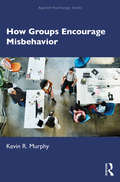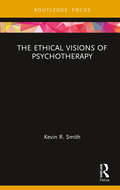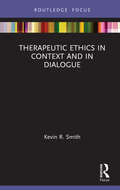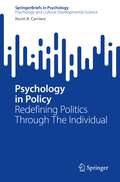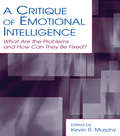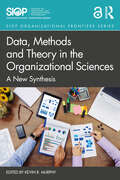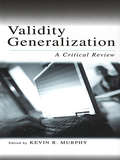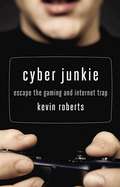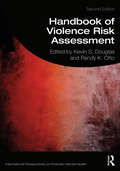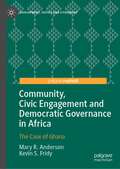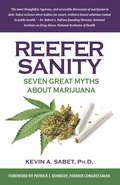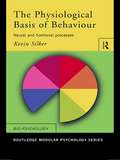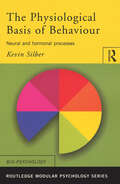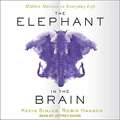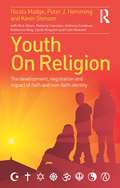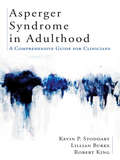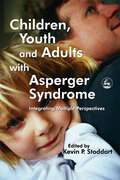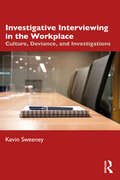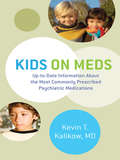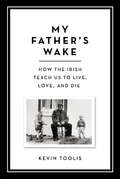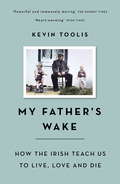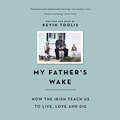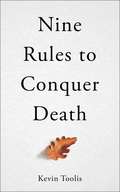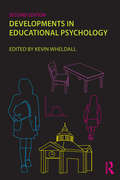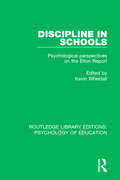- Table View
- List View
How Groups Encourage Misbehavior (Applied Psychology Series)
by Kevin R MurphyHow Groups Encourage Misbehavior explores the psychological and social processes by which groups develop a tolerance for and even encourage misbehavior. Drawing from decades of research on social, cognitive and organizational psychology, as well as a deep well of historical research, this book shows how commitment to groups, organizations and movements can turn moral individuals into amoral agents. Pulling together what have been traditionally distinct areas of study, How Groups Encourage Misbehavior provides a detailed and unified account of how good organizations go bad and how groups of all types can push otherwise honest and upright individuals to behave in ways that violate laws and social norms. This text describes how social norms, rationalization, the characteristics of formal and informal groups, attachment to groups and organizations, and the structure of organizational life can all contribute to misbehavior. Each chapter includes one or more sidebar discussions of relevant and interesting examples to illustrate the ways groups and organizations encourage and support misbehavior. The final two chapters discuss how many of these same attributes and processes can be used to encourage positive behaviors and foster recovery from dysfunctional and corrupt cultures and modes of behavior. A valuable text for a broad range of psychology courses, How Groups Encourage Misbehavior will especially appeal to practitioners, scholars, and students interested in ethics in organizations and the intersection between social psychology and organizational behavior.
The Ethical Visions of Psychotherapy
by Kevin R SmithThe standard view of psychotherapy as a treatment for mental disorders can obscure how therapy functions as a social practice that promotes conceptions of human well-being. Building on the philosophy of Charles Taylor, Smith examines the link between therapy and ethics, and the roots of therapeutic aims in modern Western ideas about living well. This is one of two complementary volumes (the other being Therapeutic Ethics in Context and in Dialogue). This volume explores the links between therapeutic aims and conceptions of well-being. It examines several cognitive-behavioral and psychoanalytic therapies to illustrate how they can be distinguished by their divergent ethics. Smith argues that because research utilizing standard measures of efficacy shows little difference between the therapies, the assessment of their relative merits must include evaluation of their distinct ethical visions. A key text for upper level undergraduates, postgraduate students, and professionals in the fields of psychotherapy, psychoanalysis, theoretical psychology, and philosophy of mind.
Therapeutic Ethics in Context and in Dialogue
by Kevin R SmithThe standard view of psychotherapy as a treatment for mental disorders can obscure how therapy functions as a social practice that promotes conceptions of human well-being. Building on the philosophy of Charles Taylor, Smith examines the link between therapy and ethics, and the roots of therapeutic aims in modern Western ideas about living well. This volume builds on a complementary volume (The Ethical Visions of Psychotherapy), to explore therapeutic conceptions of human flourishing. Smith illustrates how therapeutic aims implicitly promote ideas about a good life, even though therapists rarely tell their patients how they should live. Taylor’s history of the modern identity provides a framework to examine the historical and cultural origins of therapeutic ethics. Utilizing Taylor’s work on practical reasoning and ethical debate, Smith considers the prospects for dialogue between the divergent ethical visions promoted by different psychotherapies. A key text for upper-level undergraduates, postgraduate students, and professionals in the fields of psychotherapy, psychoanalysis, theoretical psychology, and philosophy of mind.
Psychology in Policy: Redefining Politics Through The Individual (SpringerBriefs in Psychology)
by Kevin R. CarriereThis book takes an insider perspective of the psychological issues of creating policy. Instead of considering what the products of policy are - often the case in psychological and political science work - this book examines the individual processes present in proposing and engaging with policy. The individual who engages with the policy and its meanings, the individual who resists the policy through conformity, and the individual who writes the policy for their own ideological purposes are all political actors in a psychological system. This book puts forward a cultural political psychology as the psychological study of the process of values, policy, and power dynamics. Through exploring public policy through private policy generation and individual interaction, this book pushes theoretical understandings of policy and activism in new ways. Centering on an individual’s own values in facing various policy restrictions from governments, parents, or peers, the importance of examining collective actions and also collective inactions of individuals is noted and expanded on in the text. The book provides applications of its arguments through examining the processes of unionization and actualized democracy. It seeks to point out new research avenues, including the hypogeneralization of values, one’s exclusion through activism, and everyday revolutions. This book addresses the centrality of the individual and meaning-making systems when considering where policy, politics, and psychology intersect. This book is primarily addressed to psychologists and political scientists interested in how to make change in public policy. While the experiences within the book are United States-centric, the thoughts and theories behind them are meant to be applicable to a wide variety of political systems. As there is currently very little literature on the topic, this book seeks to fill the gap and offer concise information on such an important dimension of cultural and political psychology. It is expected that the book will be of great interest for researchers in these areas, as well as for graduate-level students. In particular, this book will be relevant to researchers and students working on political psychology, public policy, development, community psychology, social representations, semiotics, activism, and social movements, to name a few.
A Critique of Emotional Intelligence: What Are the Problems and How Can They Be Fixed? (Applied Psychology Series)
by Kevin R. MurphyThis book analyzes important criticisms of the current research on Emotional Intelligence (EI), a topic of growing interest in the behavioral and social sciences. It looks at emotional intelligence research and EI interventions from a scientific and measurement perspective and identifies ways of improving the often shaky foundations of our current conceptions of emotional intelligence. With a balanced viewpoint, A Critique of Emotional Intelligence includes contributions from leading critics of EI research and practice (e.g., Frank Landy, Mark Schmit, Chockalingam Viswesvaran), proponents of EI (e.g., Neal Ashkanasy, Catherine Daus), as well as a broad range of well-informed authors. Proponents claim that EI is more important in life than academic intelligence, while opponents claim that there is no such thing as emotional intelligence. Three key criticisms that have been leveled at emotional intelligence include: (1) EI is poorly defined and poorly measured; (2) EI is a new name for familiar constructs that have been studied for decades; and (3) claims about EI are overblown. While the book presents these criticisms, the final section proposes ways of improving EI research and practice with EI theories, tests, and applications.
Data, Methods and Theory in the Organizational Sciences: A New Synthesis (SIOP Organizational Frontiers Series)
by Kevin R. MurphyData, Methods and Theory in the Organizational Sciences explores the long-term evolution and changing relationships between data, methods, and theory in the organizational sciences. In the last 50 years, theory has come to dominate research and scholarship in these fields, yet the emergence of big data, as well as the increasing use of archival data sets and meta-analytic methods to test empirical hypotheses, has upset this order. This volume examines the evolving relationship between data, methods, and theory and suggests new ways of thinking about the role of each in the development and presentation of research in organizations. This volume utilizes the latest thinking from experts in a wide range of fields on the topics of data, methods, and theory and uses this knowledge to explore the ways in which behavior in organizations has been studied. This volume also argues that the current focus on theory is both unhealthy for the field and unsustainable, and it provides more successful ways theory can be used to support and structure research, and demonstrates the most effective techniques for analyzing and making sense of data. This is an essential resource for researchers, professionals, and educators who are looking to rethink their current approaches to research, and who are interested in creating more useful and more interpretable research in the organizational sciences.
Validity Generalization: A Critical Review (Applied Psychology Series)
by Kevin R. MurphyThis volume presents the first wide-ranging critical review of validity generalization (VG)--a method that has dominated the field since the publication of Schmidt and Hunter's (1977) paper "Development of a General Solution to the Problem of Validity Generalization." This paper and the work that followed had a profound impact on the science and practice of applied psychology. The research suggests that fundamental relationships among tests and criteria, and the constructs they represent are simpler and more regular than they appear. Looking at the history of the VG model and its impact on personnel psychology, top scholars and leading researchers of the field review the accomplishments of the model, as well as the continuing controversies. Several chapters significantly extend the maximum likelihood estimation with existing models for meta analysis and VG. Reviewing 25 years of progress in the field, this volume shows how the model can be extended and applied to new problems and domains. This book will be important to researchers and graduate students in the areas of industrial organizational psychology and statistics.
Cyber Junkie: Escape the Gaming and Internet Trap
by Kevin RobertsVideo gaming and Internet surfing are the top sources of entertainment for tens of millions of North Americans today. As these technologies continue to grow and flourish, so does the number of people becoming obsessively absorbed in the imagination and fantasy that they present. More and more people are isolating themselves, turning their backs on reality, ignoring family and friends, and losing sleep and even their jobs due to excessive use of video games and the Internet, and they continue to do so despite harmful consequences to their mental, physical, and spiritual health, a telltale sign of addiction. In this groundbreaking book, recovering video game addict Kevin Roberts uses extensive scientific and social research, complemented by his and others' personal stories, to give compulsive gamers and surfers--and their family and friends--a step-by-step guide for recovery. He outlines the ways that 'cyber junkies' exhibit the classic signs of addiction and reveals how they can successfully recover by following a program similar to those used for other addictions. Readers learn to identify whether they have an addiction, find the right resources to get individualized help, and regain a rewarding life away from the screen by learning new thoughts and behaviors that free them from the cravings that rule their lives. Included is a guide for parents for working with their addicted children. Kevin Roberts is a recovering video game addict who runs support groups to help others struggling with cyber addiction get their lives back on track. He is a nationally recognized expert on video gaming addiction and a regular conference speaker. Roberts has a background in education and is the developer of a sixteen-module curriculum designed to give those with attention deficit/hyperactivity disorder (ADHD), often a driving factor of video game and internet addiction, the skills they need to succeed. Cyber Junkie is his first book.
Handbook of Violence Risk Assessment (International Perspectives on Forensic Mental Health)
by Kevin S. Douglas; Randy K. OttoThe Handbook of Violence Risk Assessment, Second Edition, builds on the first edition’s comprehensive discussion of violence risk assessment instruments with an update of research on established tools and the addition of new chapters devoted to recently developed risk assessment tools. Featuring chapters written by the instrument developers themselves, this handbook reviews the most frequently used violence risk assessment instruments—both actuarial and structured professional judgment—that professionals use to inform and structure their judgments about violence risk. Also included are broader chapters that address matters such as the consideration of psychopathy and how the law shapes violence risk assessment. Already the primary reference for practitioners, researchers, and legal professionals in this area, this second edition’s easy-to-access, comprehensive, and current information will make it an indispensable reference for those in the field.
Community, Civic Engagement and Democratic Governance in Africa: The Case of Ghana (Development, Justice and Citizenship)
by Mary R. Anderson Kevin S. FridyThis book explores how community influences civic engagement, focusing on the case of Ghana. It offers an interdisciplinary perspective to those studying psychology, political development and civic engagement in African countries. Previous research has shown that the social and economic context in which an individual interacts influences their political behaviors and attitudes, and that personal characteristics account for differences in political behavior and attitudes. This work moves away from the cultural demographics of a person, which often take center stage in existing investigations of partisan political behavior in the African context, and addresses the following five questions: (1) To what extent do individual traits influence civic engagement in Ghana? (2) To what extent is community identity similar or different in small rural villages versus large metropolitan areas in Ghana and how does community identity influence civic engagement? (3) To what extent does trust influence civic engagement in Ghana? (4) What factors and activities influence political knowledge and how does political knowledge influence civic engagement? (5) What is the status of women in civic engagement?
Reefer Sanity: Seven Great Myths About Marijuana
by Kevin SabetIn this book, Kevin A. Sabet argues that the United States should not legalize pot with all of its attendant social costs, nor damage the future prospects of pot smokers by prosecuting and jailing them.
The Physiological Basis of Behaviour: Neural and Hormonal Processes
by Kevin SilberThe Physiological Basis of Behaviour deals with the basic structures of the central nervous system, the techniques used in neuroscience and examnines how drugs affect the brain.
The Physiological Basis of Behaviour: Neural and Hormonal Processes (Routledge Modular Psychology Ser.)
by Kevin SilberAn introduction to the basic structures of the central nervous system, the techniques used in neuroscience and a short discussion of the affect of drugs on the brain.
The Elephant In The Brain: Hidden Motives In Everyday Life
by Kevin Simler Robin HansonHuman beings are primates, and primates are political animals. Our brains, therefore, are designed not just to hunt and gather but also to help us get ahead socially, often via deception and self-deception. But while we may be self-interested schemers, we benefit by pretending otherwise. The less we know about our own ugly motives, the better - and thus, we don't like to talk, or even think, about the extent of our selfishness. This is "the elephant in the brain". <p><p> Such an introspective taboo makes it hard for us to think clearly about our nature and the explanations for our behavior. The aim of this book, then, is to confront our hidden motives directly - to track down the darker, unexamined corners of our psyches and blast them with floodlights. Then, once everything is clearly visible, we can work to better understand ourselves: Why do we laugh? Why are artists sexy? Why do we brag about travel? Why do we prefer to speak rather than listen? <p> Our unconscious motives drive more than just our private behavior; they also infect our venerated social institutions such as art, school, charity, medicine, politics, and religion. In fact, these institutions are in many ways designed to accommodate our hidden motives, to serve covert agendas alongside their "official" ones. The existence of big hidden motives can upend the usual political debates, leading one to question the legitimacy of these social institutions, and of standard policies designed to favor or discourage them.
Youth On Religion: The development, negotiation and impact of faith and non-faith identity
by Nicola Madge Kevin Stenson Peter HemmingGlobalisation has led to increasing cultural and religious diversity in cities around the world. What are the implications for young people growing up in these settings? How do they develop their religious identities, and what roles do families, friends and peers, teachers, religious leaders and wider cultural influences play in the process? Furthermore, how do members of similar and different cultural and faith backgrounds get on together, and what can young people tell us about reducing conflict and promoting social solidarity amid diversity? Youth On Religion outlines the findings from a unique large-scale project investigating the meaning of religion to young people in three multi-faith locations. Drawing on survey data from over 10,000 young people with a range of faith positions, as well as a series of fascinating interviews, discussion groups and diary reports involving 160 adolescents, this book examines myriad aspects of their daily lives. It provides the most comprehensive account yet of the role of religion for young people growing up in contemporary, multicultural urban contexts. Youth On Religion is a rigorous and engaging account of developing religiosity in a changing society. It presents young people’s own perspectives on their attitudes and experiences and how they negotiate their identities. The book will be an instructive and valuable resource for psychologists, sociologists, criminologists, educationalists and anthropologists, as well as youth workers, social workers and anyone working with young people today. It will also provide essential understanding for policy makers tackling issues of multiculturalism in advanced societies.
Asperger Syndrome in Adulthood: A Comprehensive Guide for Clinicians
by Robert King Lillian Burke Kevin StoddartA thorough overview of Asperger syndrome for mental health professionals. Despite the dramatic proliferation of research, clinical perspectives, and first-person accounts of Asperger Syndrome (AS) in the last 15 years, much of this information has focused on the application of the diagnosis to children, even though AS displays persistence over time in individuals. This book is one of the only guides to Asperger Syndrome as it manifests itself in adults. It integrates research and clinical experience to provide mental health professionals with a comprehensive discussion of AS in adulthood, covering issues of diagnosis as well as co-morbid psychiatric conditions, psychosocial issues, and various types of interventions--from psychotherapy to psychopharmacology. It also discusses basic diagnostic criteria, controversies about the disorder, and possible interventions and treatments for dealing with the disorder.
Children, Youth and Adults with Asperger Syndrome: Integrating Multiple Perspectives
by Kevin StoddartThis book offers a comprehensive overview of clinical, research and personal perspectives on Asperger Syndrome, including contributions from parents and experts in the fields of psychology, social work, psychiatry, genetics, sexology and vocational counselling. It includes first-hand accounts from adults with AS, highlighting their difficulties in areas such as social competence and education. Specialist perspectives on AS, including sexuality and relationships, finding and keeping employment and anxiety and depression are sensitively addressed. The viewpoints of parents explore experiences of parenting AS individuals. These varied approaches to living with AS complement the emerging literature on theory, research and practice in this area. The broad scope of Children, Youth and Adults with Asperger Syndrome guarantees a wide readership among practitioners, students, parents, young people and adults with AS, educates service providers how to assist people with AS and suggests a model of interdisciplinary collaboration for administrators and funders.
Investigative Interviewing in the Workplace: Culture, Deviance, and Investigations
by Kevin SweeneyBased on extensive interdisciplinary research and the author’s over 30 years of experience in the field, this book provides best practice skills for auditors and investigators in any type of investigation and adapts them to ensure they are relevant to a corporate environment where the powers available to police are absent. In addition to providing technical skills and practical advice on investigative interviewing, former police investigator Kevin Sweeney explains how to analyze information to assist in the investigation and to identify emerging trends to provide opportunities to prevent problems before they occur. Readers will come to understand legal concepts such as the chain of evidence, the psychological factors involved in questioning, and the sociological factors that can help to build a macro understanding of the organization and the event in question. This book will become an essential resource for professionals involved in auditing or investigation work of any type in the corporate or public sectors, in contexts including human resources, employee relation investigations, auditing, or where criminal activity is suspected.
Kids on Meds: Up-to-Date Information About the Most Commonly Prescribed Psychiatric Medications
by Kevin T. KalikowA popular guide for consumers about all the psychiatric drugs used with kids. Arguments abound about whether psychiatric medicines are over- or underprescribed, even as their use in childhood and adolescence has become commonplace. Knowing how various medicines work, their side effects and doses, will help parents understand their child's experience. And if you are considering medication for your child, the crucial question is, could it help? This book is an overview of the four groups of medicines most commonly used in child and adolescent psychiatry--for ADHD, depression and anxiety, psychosis, and mood disorders. It discusses not only the drugs but also how they work in the body, as well as the culture of today's medical practice. Kevin T. Kalikow offers measured advice on how to evaluate and treat young people with medicine and how to decide if medicine isn't the right course of action. It is essential reading for anyone who needs to wade through the complicated--and often contradictory--medical information about kids and drugs.
My Father's Wake: How The Irish Teach Us To Live, Love, And Die
by Kevin ToolisAn intimate, lyrical look at the ancient rite of the Irish wake--and the Irish way of overcoming our fear of deathDeath is a whisper for most of us. Instinctively we feel we should dim the lights, pull the curtains, and speak softly. But on a remote island off the coast of Ireland's County Mayo, death has a louder voice.Each day, along with reports of incoming Atlantic storms, the local radio runs a daily roll call of the recently departed. The islanders go in great numbers, young and old alike, to be with their dead. They keep vigil with the corpse and the bereaved company through the long hours of the night. They dig the grave with their own hands and carry the coffin on their own shoulders. The islanders cherish the dead--and amid the sorrow, they celebrate life, too.In My Father's Wake, acclaimed author and award-winning filmmaker Kevin Toolis unforgettably describes his own father's wake and explores the wider history and significance of this ancient and eternal Irish ritual. Perhaps we, too, can all find a better way to deal with our mortality--by living and loving as the Irish do.
My Father's Wake: How the Irish Teach Us to Live, Love and Die
by Kevin ToolisDeath is a whisper in the Anglo-Saxon world. But on a remote island, off the coast of County Mayo, it has a louder voice. The local radio station runs a thrice-daily roll-call of the recently departed. The islanders keep vigil with the corpse and share in the sorrow of the bereaved. The living and the dead are bound together in the oldest rite of humanity. In My Father's Wake, Kevin Toolis gives an intimate, eye-witness account of the death and wake of his father, celebrating the spiritual depth of the Irish Wake and asking if we too can find a better way to deal with our mortality, by living and loving in the acceptance of death.
My Father's Wake: How the Irish Teach Us to Live, Love and Die
by Kevin ToolisDeath is a whisper in the Anglo-Saxon world. But on a remote island, off the coast of Co. Mayo, it has a louder voice. Along with reports of incoming Atlantic storms, the local radio station runs a thrice daily roll call of ordinary deaths. The islanders go in great numbers, often with young children, to wake with their dead. They keep the corpse and the bereaved company through the long hours of the night. They dig the grave with their own hands. It is a communal triumph in overcoming the death of the individual. In this beautifully written memoir, Kevin Toolis gives an intimate, eye-witness account of the death and wake of his father, and explores the wider history of the Irish Wake. With an uplifting, positive message at its heart, My Father's Wake celebrates the spiritual depth of the Irish Wake and asks if we can find a better way to deal with our mortality, by living and loving in the acceptance of death.Written and Read by Kevin Toolis(p) 2017 Orion Publishing Group
Nine Rules to Conquer Death
by Kevin ToolisDrawing on the wisdom of the ancients, from the Aztecs and the Iliad to the Irish Wake, Nine Rules to Conquer Death provides the answer to those eternal mortal fears and longings. Kevin Toolis distils insights drawn from millennia of human experience into a profound and punchy guide to dying – and living – well. Why life would be terrible if we did not die. Why we should embrace our mortality, and see the life-affirming necessity of sharing the company of the dead. Nine Rules up-ends every fear and presumption we hold about death to help us live a more authentic, fear-free life. Nine Rules is a guidebook like no other.
Developments in Educational Psychology: How Far Have We Come In 25 Years?
by Kevin WheldallReview comment on the first edition "Wheldall asks himself and his readers what has transpired within the field of educational psychology … and what its relevance actually is for teaching, learning and education. As such it is a ‘must read’ for all educational psychologists, students of educational psychology, teachers and teacher trainers." Professor Paul Kirschner, Open Universiteit, British Journal of Educational Technology What is the relevance of educational psychology in the twenty first century? In this collection of essays, leading educational psychologists reflect on the seminal developments which have been made in the field over the past twenty five years or so and assess how far we have progressed. Given a broad and personal remit to address a range of issues, the contributors review and critique a variety of topics, including: intelligence; communication; family environments; individual differences; reading; peer learning; classroom behaviour; and higher education. Providing provocative and challenging insights into the state of contemporary educational psychology, the contributors acknowledge throughout the successes and progression in the field, but with a critical edge and a challenge being thrown down to psychologists of education to make study more seriously informed and as a consequence, reformed. Now in its second edition this compelling text for students and researchers is thoroughly updated and includes four new chapters.
Discipline in Schools: Psychological Perspectives on the Elton Report (Routledge Library Editions: Psychology of Education)
by Kevin WheldallWhat can schools and teachers do to promote discipline in the classroom? How do discipline and learning interact? The Elton Committee was set up in 1989 to consider ‘what action can be taken to secure the orderly atmosphere necessary in schools for effective teaching and learning to take place’. In this collection of papers, originally published in 1992, ten leading figures in the psychology of education reflect on some of the issues raised by the Elton Report and provide a series of psychological models for tackling problems of discipline, disorder and disruption in schools. Areas covered include whole-school approaches to discipline, the connection between learning difficulties and discipline problems, the effectiveness of positive behavioural methods of classroom management, the possible uses of techniques derived from family therapy in classroom discipline situations and the ‘good relationship’ between teacher and student as an agent of change. Though the perspectives of the contributors are very different, the emphasis throughout is on establishing a way forward for schools that will be valid and workable both in institutional terms and for the individual teacher in the classroom.
